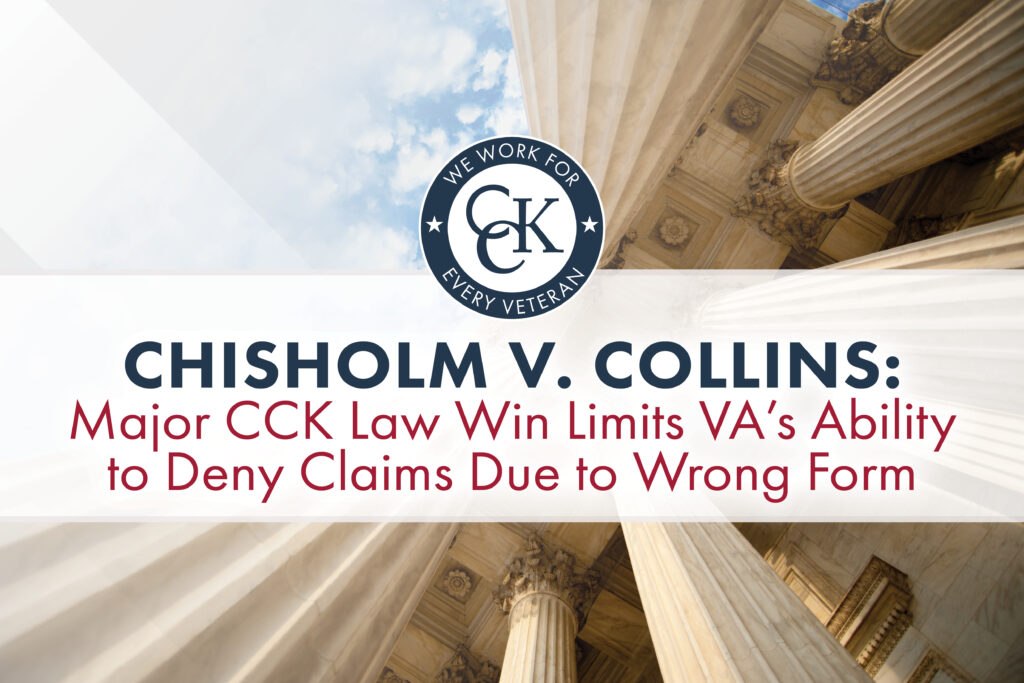Chisholm v. Collins: Major CCK Law Win Limits VA’s Ability to Deny Claims Due to Wrong Form

CCK Law: Our Vital Role in Veterans Law
In Chisholm v. Collins, the Court of Appeals for Veterans Claims (CAVC) issued a pivotal decision limiting the Department of Veterans Affairs’ (VA) ability to rigidly enforce specific form usage when veterans seek to preserve effective dates by filing supplemental claims.
The case was argued by Chisholm Chisholm & Kilpatrick (CCK Law) partner Jenna Zellmer on behalf of appellant Robert Chisholm, founding partner of CCK Law. The court sided with CCK Law and supported a broader, pro-claimant reading of VA regulations, safeguarding veterans’ rights to retroactive benefits.
This article examines the legal reasoning and practical consequences of the decision, which centers on whether a VA Form 21-8940, Veteran’s Application For Increased Compensation Based On Unemployability (i.e., a TDIU application), can qualify as a supplemental claim even when not submitted with VA Form 20-0995.

What is Continuous Pursuit of a Claim?
For veterans navigating the VA disability system, the distinction between new claims and supplemental claims can profoundly affect their retroactive benefits. “Continuous pursuit” of a claim preserves the “effective date” from which backpay will be calculated once a claim is approved.
Under current regulations, a veteran may continuously pursue a previously denied claim by filing a supplemental claim within one year of an unfavorable decision. However, VA has insisted that such supplemental claims be submitted only on a specific form—VA Form 20-0995.
The law firm of Chisholm Chisholm & Kilpatrick challenged this interpretation as overly rigid. The court agreed, holding that a veteran’s timely submission of a TDIU application (VA Form 21-8940), filed within a year of a prior denial, constituted a valid supplemental claim—even though it was not filed on the 20-0995. This clarification not only preserved the veteran’s earlier effective date but also enabled Chisholm Chisholm & Kilpatrick to receive fees for the representation, because attorneys are not permitted to charge fees for assisting with new claims.
Continuous Pursuit and the Role of Forms
Under the Appeals Modernization Act (AMA), a veteran may preserve their effective date by “continuously pursuing” a claim through a supplemental claim filed within one year of a decision. This system was designed to streamline appeals while safeguarding veterans’ rights. However, VA’s internal processing standards have sometimes prioritized form over substance.
In particular, VA regulations specify that supplemental claims must be filed on a form “prescribed by the Secretary.” VA has interpreted this language to mean that only the 20-0995 form qualifies.
Case Facts: Chisholm v. Collins
Following a denial of increased ratings for several service-connected conditions, the veteran in this case submitted VA Form 21-8940—an official application for Total Disability based on Individual Unemployability (TDIU)—within one year of the denial. The form clearly referenced the same conditions underlying the denied claims.
Despite the clear continuity, VA treated the TDIU application as a new claim rather than a supplemental one. Consequently, it assigned a later effective date—cutting off years of potential retroactive compensation. Moreover, because the agency viewed the filing as a new claim, it denied the attorney’s request for fees, asserting that attorneys cannot be compensated for filing initial claims.
The veteran’s attorney appealed both the effective date determination and the denial of fees. While the appeal was pending, VA ultimately granted TDIU benefits back to 2013. However, it continued to maintain that the 8940 was not a supplemental claim, seeking to avoid attorney fee liability.
The Court’s Ruling: Substance Over Form
The CAVC disagreed with VA’s interpretation. It ruled that the TDIU form submitted within one year of the prior denial did in fact qualify as a supplemental claim under 38 C.F.R. § 3.2501. The court emphasized that the regulation requires a claim to be filed on “a form prescribed by the Secretary,” but does not restrict that requirement to a single form. The 8940, being a prescribed form designed to request increased compensation, met the regulatory standard.
In a key passage, the court warned that VA’s formalism “cannot be used as a sword” to deny substantive rights. The veteran’s intent was clear, and the timing undisputed. The filing advanced the same claim stream—an essential element in preserving effective dates.
Importantly, the court declined to hold that all 8940 forms should be treated as supplemental claims. Instead, it emphasized that each filing must be evaluated in the context of whether it clearly seeks to continue the pursuit of a previously denied issue.
Implications for Veterans and Advocates
The decision in Chisholm v. Collins carries several important implications:
- Effective Date Preservation: Veterans who submit an appropriate VA form within one year of a denial may still preserve their earlier effective date, even if they use a form other than the 20-0995.
- Attorney Compensation: Attorneys can be compensated for representation that contributes to favorable outcomes on previously denied claims—even if the veteran did not use the precise form VA prefers.
- Flexibility in Filing: The ruling curbs VA’s inclination to impose rigid procedural rules not supported by regulation or statute, reinforcing a pro-veteran interpretive standard.
Conclusion
Chisholm v. Collins is a clarifying and corrective decision. It reaffirms the principle that veterans law must be administered with fairness, not formalism. By allowing a TDIU application to serve as a valid supplemental claim in the appropriate context, the court restored both justice for the individual veteran and clarity for the broader veterans law community. The decision underscores the importance of assessing substance over form and ensures that regulatory interpretation does not become a barrier to benefits that veterans have rightfully earned.
About the Author
Share this Post